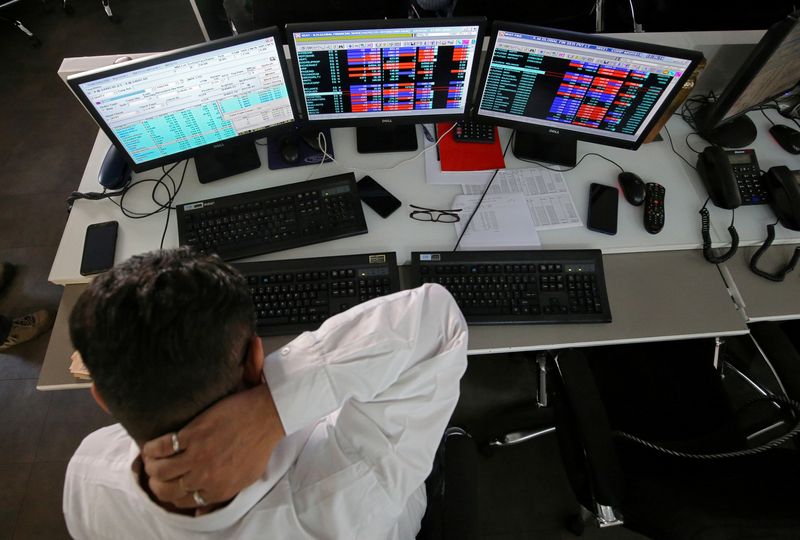 © Reuters. FILE PHOTO: A broker reacts while trading at his computer terminal at a stock brokerage firm in Mumbai, India, December 11, 2018. REUTERS/Francis Mascarenhas
2/2
© Reuters. FILE PHOTO: A broker reacts while trading at his computer terminal at a stock brokerage firm in Mumbai, India, December 11, 2018. REUTERS/Francis Mascarenhas
2/2
By Elizabeth Dilts Marshall
NEW YORK (Reuters) - Global share markets fell on Tuesday as oil prices climbed yet further, driven by the United States banning Russian oil and other energy imports over Moscow's invasion of Ukraine.
U.S. President Joe Biden made the announcement on Tuesday, while Britain said it would phase out imports of Russian oil and oil products by the end of 2022.
Benchmark Brent crude for May rose to an intra-day high of $131.27 a barrel before settling at $127.98 a barrel, 3.9% higher, while U.S. crude futures settled at $123.70 a barrel, a 3.6% increase.
Russia, which ships 7 million to 8 million barrels per day of crude and fuel to global markets, has been the target of Western sanctions since its invasion of Ukraine on Feb. 24.
Russia calls its actions a "special operation," and it said earlier this week that prices could surge to $300 a barrel and it could close the main gas pipeline to Germany if the West blocked its oil exports.
Jason McMann, head of geopolitical risk analysis at Morning Consult, called the U.S. ban noteworthy, but said the "real show-stopper" would be Europe banning Russian energy imports.
"Given Europe's relatively high dependence on energy supplies from Russia, such a move, if it materializes, would have major economic and geopolitical ramifications," he said.
The news added to volatility in the markets and stoked fears of inflation rising as European and other economies cooled.
The MSCI world equity index, which tracks shares in 50 countries, fell by 0.8% as of 5:40 p.m. ET (2250 GMT).
The Dow Jones Industrial Average fell 184.74 points, or 0.56%, the S&P 500 lost 30.39 points, or 0.72% and the Nasdaq Composite dropped 35.41 points, or 0.28%. The STOXX 600 was down 0.51%.
Solita Marcelli, chief investment officer in the Americas for UBS's wealth management arm, said the increase in oil prices over the past week - the second-biggest jump in 30 years - is likely to stick, causing continued market volatility.
"The Russia-Ukraine war has driven oil prices up faster than we previously expected, but we continue to see a tight supply-demand balance for crude oil globally, even if the hostilities end and the geopolitical risk premium attached to crude declines," Marcelli said.
Gold held near record highs on Tuesday, after investors made a beeline for the traditional safe-haven metal on mounting fears around the Russia-Ukraine crisis. Spot gold dropped 0.1% to $2,050.97 an ounce.
The London Metal Exchange (LME) halted nickel trading on Tuesday after prices doubled in just hours to a record $100,000 per tonne, fueled by a race to cover short positions.
UBS Global Wealth Management recommended a neutral stance on equities and advised clients to hold commodities, energy stocks and the U.S. dollar as portfolio hedges in the short term.
The rally in oil and other commodities has heightened investor fears about global inflation. Data this week is expected to show the U.S. consumer price index climbed a stratospheric 7.9% on a year-on-year basis in February, up from 7.5% in January.
Bloomberg News reported on Tuesday that the European Union plans as soon as this week to jointly issue bonds on a potentially massive scale to finance energy and defense spending.
The news pushed up both the euro and the yield on benchmark U.S. 10-year Treasury notes. The euro bounced back from a 22-month low against the dollar, which it hit the previous session, and was last flat against the dollar at $1.0899. The yield on 10-year Treasury notes was up 11.2 basis points to 1.861% after hitting a two-month low on Monday.
The dollar index fell 0.082%.
Investors are carefully watching a European Central Bank policy meeting on Thursday. The prospect of stagflation has prompted economists to suggest policymakers might delay rate hikes until late in the year.

